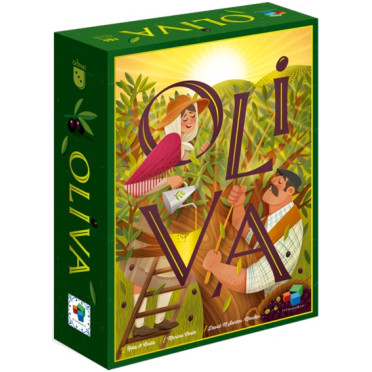Produce, harvest, and press olives to sell precious oil in Oliva.
Oliva is played in a number of rounds, depending on the number of players. At the end of the last round, the farmer with the most victory points is declared the winner.
On your turn, you select and reveal Action cards to perform the corresponding actions. Your actions become more powerful depending on the cards visible on all players' boards.
The importance of olive oil dates back to the Visigothic period, when laws protected olive trees. Arab influence then promoted the expansion of olive cultivation, and the Arabic word al-zait evolved into the modern terms Azeite in Portuguese and Aceite in Spanish.
The Portuguese olive oil industry became a major export power, recognized at the 1889 World's Fair in Paris. In the 20th century, Portugal began to industrialize its olive cultivation methods. The 1950s marked a golden age, with record expansion of olive groves and unprecedented yields, despite the persistence of small-scale local production. Export markets flourished in Asia, the United States, and European markets where Portuguese communities lived, alongside colonial trade.
As industrialization progressed, farmers turned to more profitable crops such as potatoes and wine grapes, leading to a decline in olive cultivation until the early 21st century. Today, the Mediterranean region retains its reputation for excellence, producing 95% of the world's olive oil.
Oliva traces the production of Portuguese olive oil in the 1950s and 1960s, with its large water mills and manual presses. The game pays tribute to the skill and dedication of farmers, highlighting traditional methods using sisal mats, stone-carved basins, and oven-heated water to extract the precious liquid.
In North Africa, particularly Morocco and Tunisia, traditional olive oil production peaked in the 1950s, with many small producers using ancestral pressing techniques passed down from generation to generation. These regions were known for their robust, peppery oils, produced from indigenous olive varieties well suited to the arid Mediterranean climate.
Oliva depicts both traditional and modern production methods, highlighting the productivity of the small olive groves that can still be admired today on the hills of Portugal. The game reflects the scale and quality of olive oil production in the Mediterranean, with Spain approaching Italy's production levels, followed closely by Greece and Turkey.
Copyright © 2025 www.philibertnet.com Legals - Privacy Policy - Cookie Preferences - Sitemap








